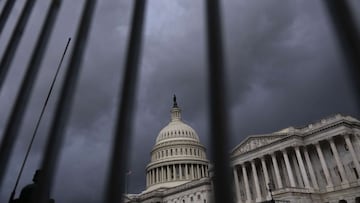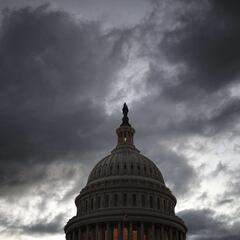Would the government shutdown impact SNAP benefits?
Protections are in place to ensure the distribution of SNAP benefits during a government shutdown, but without a debt ceiling increase, delays could be seen


On 30 September, the United States federal government will run out of money and shut down should Congress not be able to pass a spending bill.
The possibilities of a bill being passed are diminishing, and many agencies have already begun planning for a government closure. The Department of Agriculture, responsible for the distribution of nutritional assistance programs, including SNAP and WIC, has updated their "Contingency Plan" for a possible 2021 shutdown.
The updated plan states that the agency has a legal mandate to “continue operations,” for these SNAP and WIC, and other programs, “during a lapse in appropriations.”
How are these programs able to continue?
To avoid the missing of payments when Congress fails in its responsibility to keep the government open, safeguards have been built into the agency’s budget. This includes, “multi-year carry over funds; contingency reserves,” and special funds from the Office of Management and Budget to cover staff time for processes associated with these programs.
Depending on the length of the government shutdown, the number of staff covered to work during the shutdown varies. For a shorter lapse in funds (three days or less), only three staff members are kept on. During longer shutdowns, this number is increased to eight to avoid a slow down in the distribution
One aspect that will be ceased is the approval of new store authorizations for SNAP and WIC programs. But this should only impact those who receive benefits if the shutdown goes on for a significant.
Source: Department of Agriculture
SNAP benefits and the debt ceiling
One of the major points of contention driving the country towards a government shutdown is the debt ceiling.
On 1 August, a suspension to the debt limit, enacted in 2019, locked the statutory of US public debt at $28.4 trillion.
The Center on Budget and Policy Priorities reported that since August, “the Treasury has continued borrowing to finance government operations by using “extraordinary measures,” such as suspending and redeeming investments in certain federal trust funds.” However, by October, these funds are likely to be exhausted, and if the “unless Congress suspends or raises the debt limit, the government risks defaulting “on its legally binding obligations.”
Under President Trump, the national debt grew by $7.8 trillion, and many Republicans happily voted to increase the debt ceiling. However, now they are withholding their votes, arguing that it is the only way to avoid Democrats enacting their agenda. They have described the measures included in Presidnet Biden’s Build Back Better agenda as “socialist,” with Indiana Congressional Democrats are asking for a blank check to continue their reckless spending spree that will add to the record-high inflation rates, raise taxes, and expand the federal government’s role in Hoosiers’ everyday lives.”
Republicans would like the public to believe that by increasing the debt ceiling they are signaling their approval of Democratic plans to increase the debt. That is not the case, as MSNBC’s Jonathan Capehart explained by saying: “The debt ceiling is a measure that dictates how much money the Treasury can borrow to cover the debts they already have.”
In this week’s #ByeLine, @CapehartJ has words for Congress as the deadline to raise the debt ceiling approaches, saying, “not raising the debt ceiling is a dangerous game of Russian Roulette with our economy.” #SundayShow pic.twitter.com/sIQST1lYXO
— The Sunday Show with Jonathan Capehart (@TheSundayShow) September 26, 2021
If the debt ceiling is not raised, the Bipartisan Policy Center estimates that between 15 October and 4 November, the Treasury “will most likely have insufficient cash to meet all its financial obligations.” If this were to happen, the BPC projects “Treasury will be unable to meet approximately 40% of all payments due in the several weeks that follow.”
In real terms, this means that payment programs millions of Americans rely on could be delayed, including, food assistance, unemployment insurance, “military paychecks and retirement benefits to advanced child tax credit payments.”
“The U.S. government risks missing or delaying critical bills that will come due in mid- and late-October that millions of Americans rely on, from military paychecks and retirement benefits to advanced child tax credit payments.” https://t.co/kd30miRzXJ
— Seung Min Kim (@seungminkim) September 24, 2021
Will Republicans support a debt ceiling increase?
This weekend Republican leaders seemed to ease their opposition to an increase, but no votes have been taken.
Related stories

What consequences would the government shutdown have?
Congress has three days to pass a spending bill and a debt ceiling increase. Without these two bills, the country -- especially its most vulnerable residents -- could have their lives upended.
Millions of households have seen their incomes plummet after federal unemployment programs were ended earlier this month. Additionally, federal protections for tenants, like the eviction moratorium lifted with some predicting that more than 700,000 evictions could take place this year.
- Crisis económica coronavirus Covid-19
- Ciencia
- Congreso EEUU
- Deuda pública
- Coronavirus Covid-19
- Crisis económica
- Estados Unidos
- Financiación déficit
- Pandemia
- Coronavirus
- Recesión económica
- Nutrición
- Norteamérica
- Parlamento
- Déficit público
- Coyuntura económica
- Virología
- Epidemia
- Enfermedades infecciosas
- Finanzas públicas
- Enfermedades
- Microbiología
- Cuidado corporal
- América
- Medicina
- Economy
- Lifestyle
- Politics
- Finances
- Biology
- Health
- Life sciences
